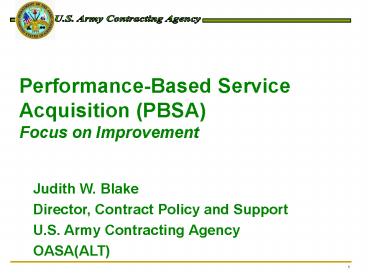IMI Brief - PowerPoint PPT Presentation
1 / 12
Title:
IMI Brief
Description:
Encourage and promote the use of commercial procedures. Understand the commercial marketplace, not the 'old boy network' ... U.S. Army Contracting Agency ... – PowerPoint PPT presentation
Number of Views:195
Avg rating:3.0/5.0
Title: IMI Brief
1
U.S. Army Contracting Agency
Performance-Based Service Acquisition
(PBSA) Focus on Improvement
- Judith W. Blake
- Director, Contract Policy and Support
- U.S. Army Contracting Agency
- OASA(ALT)
1
2
Objectives of PBSA Describing requirements in
terms of performance outcomes can help achieve
the following objectives
- Maximize Performance Allows a contractor to
deliver the required service by following its own
best practices. - Focus is on the end result
- Contractors can adjust their processes through
the life of the contract without the burden of
contract modifications - Incentives further motivate contractors to
furnish the best performance of which they are
capable
3
Objectives of PBSA (Continued)
- Maximize Competition and Innovation
- Encourage competition from the supplier base by
using performance-based requirements - Maximize opportunities for competitive
alternatives in-lieu-of government-directed
solutions. - PBSA allows for greater innovation, it has the
potential to attract a broader industrial base.
4
Objectives of PBSA (Continued)
- Encourage and promote the use of commercial
procedures - Understand the commercial marketplace, not the
old boy network - The vast majority of service requirements are
commercial in nature. - Use FAR Part 12 (Acquisition of Commercial Items)
procedures provides great benefits - Minimize the reporting burden
- Reduce the use of government-unique contract
clauses and similar requirements - Attract a broader industry base.
5
Objectives of PBSA (Continued)
- Shift risk to industry
- Contractors become responsible for achieving the
objectives in the work statement - Use their own best practices and processes
- Agencies must structure contract appropriately to
assure performance through proper motivators - Achieve savings Although the exact amount of
savings is open to debate, experience in both
government and industry has demonstrated that use
of performance requirements results in cost
savings.
6
Since at least 1994, it has been the unambiguous
policy of the Army to use performance-based
methods to the maximum extent practicable
- 18 Jun 00 DASA(P) memo requires all MACOMs to
develop - Plans to accomplish 50 PBSA service acquisitions
by 2005 - Plans to ensure that core-contracting workforce
is current in PBSA - Plans are being implemented and individuals have
been trained.
7
6 Sep 01, ASA(ALT) memo to PMs/PEOs
- Re-emphasizes the importance of the PM/PEO
community in meeting the Armys 50 PBSA goal by
2005 - Requires PM/PEOs relevant workforce be current
in PBSA training - Follow-up memo will be prepared
8
Additional Training
- National Association of Purchasing Management
(NAPM) and National Contract Management
Association (NCMA) on-line PBSA course - Available on-line at httpwww.ncma-napm.org
- Acquisition Solutions - 7 Steps to
Performance-Based Acquisition - Telephone 1.866.426.3500 or
- http//www.acqsolinc.com/docs/PerformanceBrochure
2002.pdf - OSD Change Management Center (CMC) sponsors PBSA
Action Learning Workshops - 1-2 day jumpstart event w/ senior leadership at
MACOM - 3-4 day cross-functional acquisition team
workshop to convert non-PBSA to PBSA solicitation
and QASP - 60 day action team follow-up
- httpwww.acq.osd.mil/cmc/
- POC Mr. Frank Leaming, (703) 614-7523
9
Sample Templates
- PWSs and QASPs for
- Providing Meals and Lodging at MEPS
- Cleanup of Ordnance Services
- Grounds Maintenance Services
- Custodial and Recycle Services
- Wastewater Laboratory Services
10
FY 2002 Army PBSA Utilization
- FY 2002 DD350 data for all services, excluding
construction, utilities and A-E. (includes all
RDTE) - RESULTS
- 28.7 of service obligations were classified as
PBSA - Well behind where we should be to achieve our
goal
11
Anticipated DoD Policy Statement
- You are the heart of successful PBSA --
requirements developers, program management
personnel, and quality evalutators should be
trained and should invest the time necessary to
achieve a level of competence to achieve positive
results fro PBSA program
It is DoD policy to apply performance-based
procedures to the maximum extent practicable.
Performance-based acquisition is a requirements
and program office initiative, driven by the GPRA
of 1993 and the Presidents Management Agenda.
Successful implementation of PBSA requires active
participation from the requirements, program
management and contracting communities. While
PBSA has been incorporated into the FAR system,
it has not been adequately emphasized in the
requirements generation process and associated
training programs.The result has been uneven
participation by the requirements and program
management communities in PBSA implementation.
12
U.S. Army Contracting Agency
- DISCUSSION?
12































